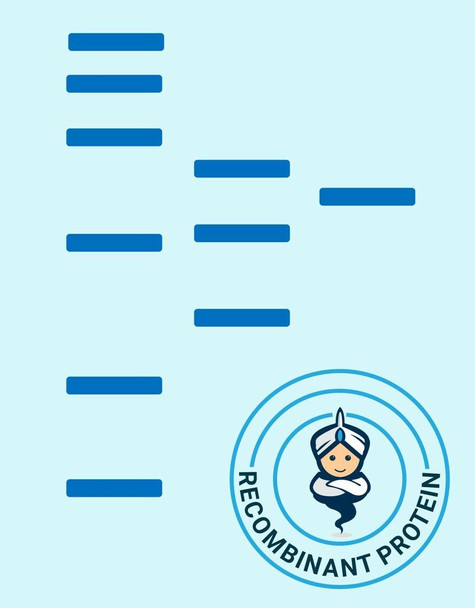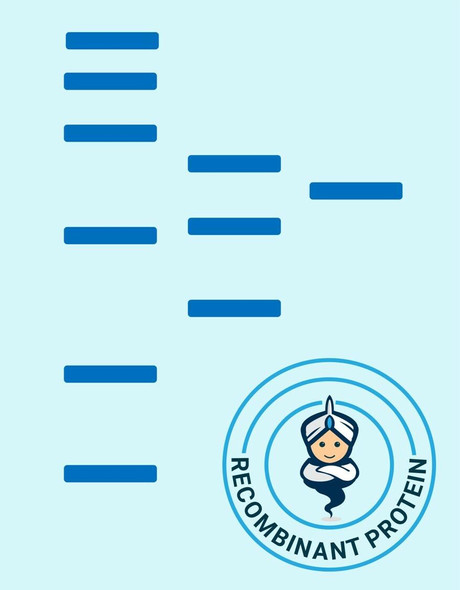Description
| Product Name: | Mouse GDNF Recombinant Protein |
| Product Code: | RPPB0296 |
| Size: | 10µg |
| Species: | Mouse |
| Target: | GDNF |
| Synonyms: | ATF1, ATF2, HFB1-GDNF, GDNF. |
| Source: | Escherichia Coli |
| Physical Appearance: | Sterile Filtered White lyophilized (freeze-dried) powder. |
| Formulation: | GDNF was lyophilized with no additives. |
| Solubility: | It is recommended to reconstitute the lyophilized Glial Derived Neurotrophic Factor in sterile 18M?-cm H2O not less than 100�g/ml, which can then be further diluted to other aqueous solutions. |
| Stability: | Lyophilized Glial-derived Neurotrophic Factor although stable at room temperature for 3 weeks, should be stored desiccated below -18°C. Upon reconstitution GDNF should be stored at 4°C between 2-7 days and for future use below -18°C.For long term storage it is recommended to add a carrier protein (0.1% HSA or BSA).Please prevent freeze-thaw cycles. |
| Purity: | Greater than 98.0% as determined by analysis by SDS-PAGE. |
| Amino Acid Sequence: | MSPDKQAAL PRRENRNRQAA AASPENSRGK GRRGQRGKNR GCVLTAIHLN VTDLGLGYET KEELIFRYCS GSCESAETMY DKILKNLSRS RRLTSDKVGQ ACCRPVAFDD DLSFLDDNLV YHILRKHSAK RCGCI |
| Biological Activity: | The ED50 as determined by the dose-dependent proliferation of C6 cells, is 0.8-0.12�g/ml. |
GDNF promotes the survival and differentiation of� neurons in culture, and is able to prevent apoptosis of motor neurons induced by axotomy. The encoded protein is processed to a mature secreted form that exists as a homodimer. The mature form of the protein is a ligand for the product of the RET (rearranged during transfection) protooncogene. In addition to the transcript encoding GDNF, two additional alternative transcripts encoding distinct proteins, referred to as astrocyte-derived trophic factors, have also been described. Mutations in this gene may be associated with Hirschsprung disease.GDNF enhances survival and morphological differentiation of� neurons and increases their high-affinity uptake.
Glial derived Neurotrophic Factor Mouse Recombinant produced in E.Coli is a non-glycosylated homodimer containing 2 x 135 amino acids and having a total molecular mass of 30.2kDa. GDNF is purified by proprietary chromatographic techniques.
| UniProt Protein Function: | GDNF: Neurotrophic factor that enhances survival and morphological differentiation of dopaminergic neurons and increases their high-affinity dopamine uptake. Defects in GDNF may be a cause of Hirschsprung disease type 3 (HSCR3). In association with mutations of RET gene, defects in GDNF may be involved in Hirschsprung disease. This genetic disorder of neural crest development is characterized by the absence of intramural ganglion cells in the hindgut, often resulting in intestinal obstruction. Defects in GDNF are a cause of congenital central hypoventilation syndrome (CCHS); also known as congenital failure of autonomic control or Ondine curse. CCHS is a rare disorder characterized by abnormal control of respiration in the absence of neuromuscular or lung disease, or an identifiable brain stem lesion. A deficiency in autonomic control of respiration results in inadequate or negligible ventilatory and arousal responses to hypercapnia and hypoxemia. Belongs to the TGF-beta family. GDNF subfamily. 5 isoforms of the human protein are produced by alternative splicing. |
| UniProt Protein Details: | Protein type:Secreted, signal peptide; Secreted Cellular Component: extracellular space; extracellular region; receptor complex Molecular Function:glial cell line-derived neurotrophic factor receptor binding; protein homodimerization activity; growth factor activity; transforming growth factor beta receptor binding Biological Process: peristalsis; enteric nervous system development; neuron differentiation; sympathetic nervous system development; ureteric bud development; transforming growth factor beta receptor signaling pathway; induction of an organ; positive regulation of cell proliferation; response to wounding; postganglionic parasympathetic nervous system development; negative regulation of neuron apoptosis; postsynaptic membrane organization; neural crest cell migration; neurite development; nervous system development; mRNA stabilization; positive regulation of monooxygenase activity; regulation of dopamine uptake; peripheral nervous system development; cell proliferation; regulation of gene expression; ureteric bud branching; positive regulation of transcription from RNA polymerase II promoter; positive regulation of cell differentiation; metanephros development; transmembrane receptor protein tyrosine kinase signaling pathway |
| UniProt Code: | P48540 |
| NCBI GenInfo Identifier: | 1346126 |
| NCBI Gene ID: | 14573 |
| NCBI Accession: | P48540.1 |
| UniProt Secondary Accession: | P48540,O09058, P70446, P97919, P97920, Q6LEL9, |
| UniProt Related Accession: | P48540 |
| Molecular Weight: | 26,606 Da |
| NCBI Full Name: | Glial cell line-derived neurotrophic factor |
| NCBI Synonym Full Names: | glial cell line derived neurotrophic factor |
| NCBI Official Symbol: | Gdnf�� |
| NCBI Official Synonym Symbols: | AI385739�� |
| NCBI Protein Information: | glial cell line-derived neurotrophic factor; ATF; mGDNF; astrocyte-derived trophic factor |
| UniProt Protein Name: | Glial cell line-derived neurotrophic factor |
| UniProt Synonym Protein Names: | Astrocyte-derived trophic factor; ATF |
| Protein Family: | GDNF family receptor |
| UniProt Gene Name: | Gdnf�� |
| UniProt Entry Name: | GDNF_MOUSE |










